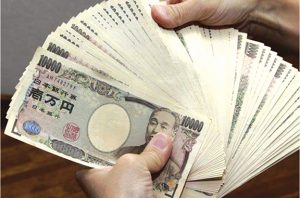Bloomberg
The yen falls to a 24-year low and Japanese bonds tumbled, prompting a warning from the Bank of Japan (BOJ) as its easy monetary policy increasingly feels strain of rising interest rates globally.
The currency falls more than 0.5% to 135.19 per dollar, the lowest since October 1998, as Treasury yields extended inflation-shock driven gains and the Bank of Japan offered to buy more bonds to cap local equivalents.
That prompted BOJ Governor Haruhiko Kuroda to deliver his clearest warning yet that the impact of rapid slides in the currency are damaging for the economy.
The yen has tumbled almost 15% this year — the worst-performing major currency — as the BOJ keeps rates anchored to boost a sluggish economy while US yields surge on bets for continued Federal Reserve hikes.
The shock higher-than-expected US inflation print has heaped pressure on the Fed to intensify monetary tightening, boosting the dollar. In sharp contrast, the BOJ looks set to maintain its super-loose stance at its meeting later in the week.
“A recent rapid depreciation of the yen is undesirable and negative for the economy,†Kuroda said in response to questions in parliament. “They increase uncertainties and make it hard for businesses make plans.â€
Kuroda’s comments gave the yen some support, dragging it back from the 135 level.
Senior Japanese officials already delivered a ramped-up warning on the yen’s decline, putting their concern in a written statement for the first time as they seek to keep a floor under the currency.
Kuroda underlined that message, pledging to work closely with the government. The talk of close cooperation has prompted some BOJ watchers to flag the chance of adjustments or tweaks to policy guidance at the conclusion of a meeting.
With the Federal Reserve expected to deliver at least a half-percentage point rate hike before the BOJ meets, the downward pressure on the yen is set to continue.
The weakening yen is expected to have a mixed impact on domestic economy, hurting household budgets but providing a boost to exports. A further slide would increase pressure on neighbouring Asian economies, which are losing out in export competitiveness.
“While Japanese authorities have stepped up warnings, there are few tools available to stop this momentum,†said Akira Moroga, manager of currency products at Aozora Bank in Tokyo.
“The environment remains ripe for speculators to drive dollar-yen higher.â€
With Japan’s government bond yields under severe upward pressure, the BOJ ramped up the defense of its policy targets, saying it would buy an additional 500 billion yen ($3.7 billion) worth of 5-year and 10-year bonds.
 The Gulf Time Newspaper One of the finest business newspapers in the UAE brought to you by our professional writers and editors.
The Gulf Time Newspaper One of the finest business newspapers in the UAE brought to you by our professional writers and editors.
